
Creating Statewide Change
Contents:
- About the Council
- Letter from the Executive Director and Council Chair
- Amplifying Advocates Stories
- Hispanic Disability Outreach
- Celebrating North Carolina Advocates
- Creating Statewide Change: Council Funded Initiatives
- Budget
The 2024 Impact Report is also available as a PDF download in English and Spanish.
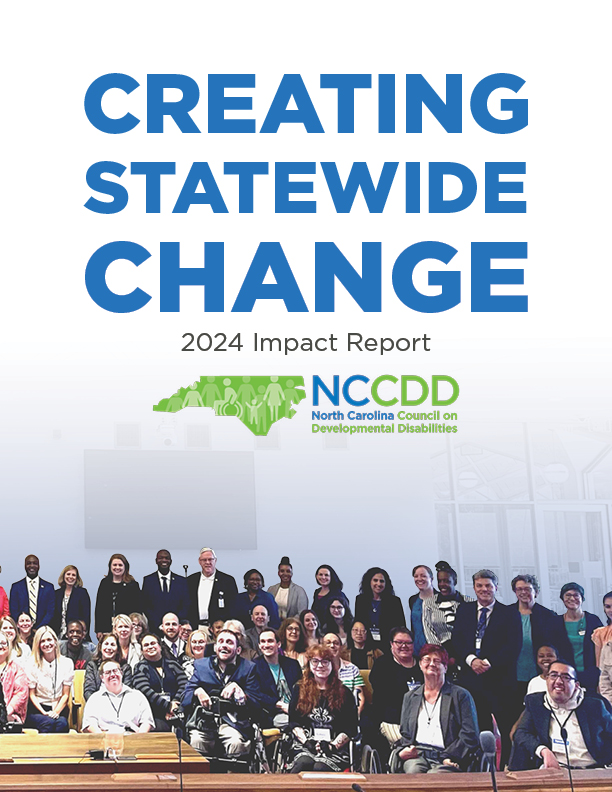
Download the |
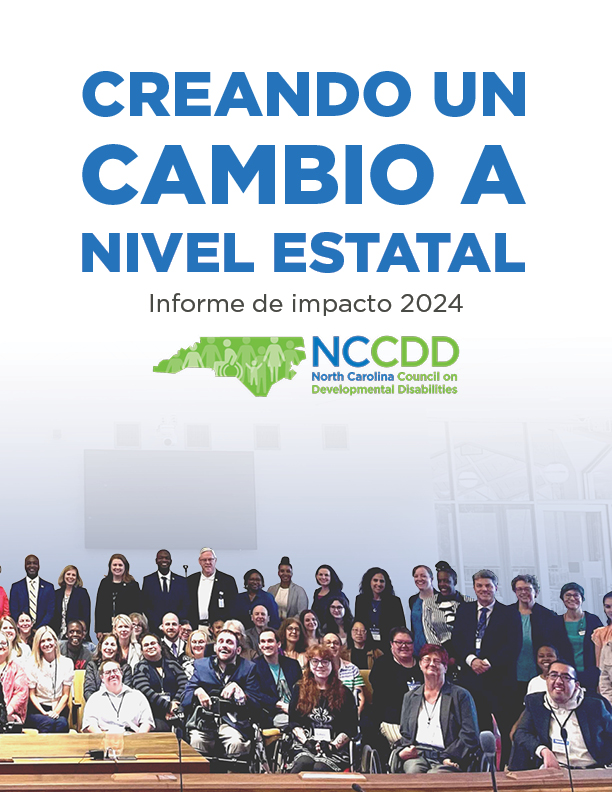
Download the |
This project is supported by grant number 2401NCSCDD ($2,162,660.00), which is 100% federal funding, from the U.S. Administration for Community Living, Department of Health and Human Services, Washington, D.C. 20201. The contents are those of the author(s) and do not necessarily represent the official views of, nor an endorsement, by ACL/HHS, or the U.S. Government.
About the Council
The North Carolina Council on Developmental Disabilities (NCCDD), a 40-member body appointed by the Governor, is made up of:
- People with intellectual and/or other developmental disabilities (I/DD)
- Parent/Family member/Guardian
- Representatives of State agencies
- State legislators
- Representatives from Disability Rights NC and the Carolina Institute for Developmental Disabilities
- Provider and Local Management Entities/Managed Care Organization representatives (LME/MCO)
The Council represents all of North Carolina and is responsible for carrying out the provisions of the Developmental Disabilities Assistance and Bill of Rights Act (DD Act) and making sure that the Council is a member-driven, effective, efficient, and accountable organization. Serving up to two four-year terms, the membership is composed of 60 percent of people with intellectual or other developmental disabilities (I/DD) or family members, and the remainder with representatives from state agencies, nonprofit and professional organizations. The Council guides all initiatives and contracts.
Letter from the Executive Director and Council Chair
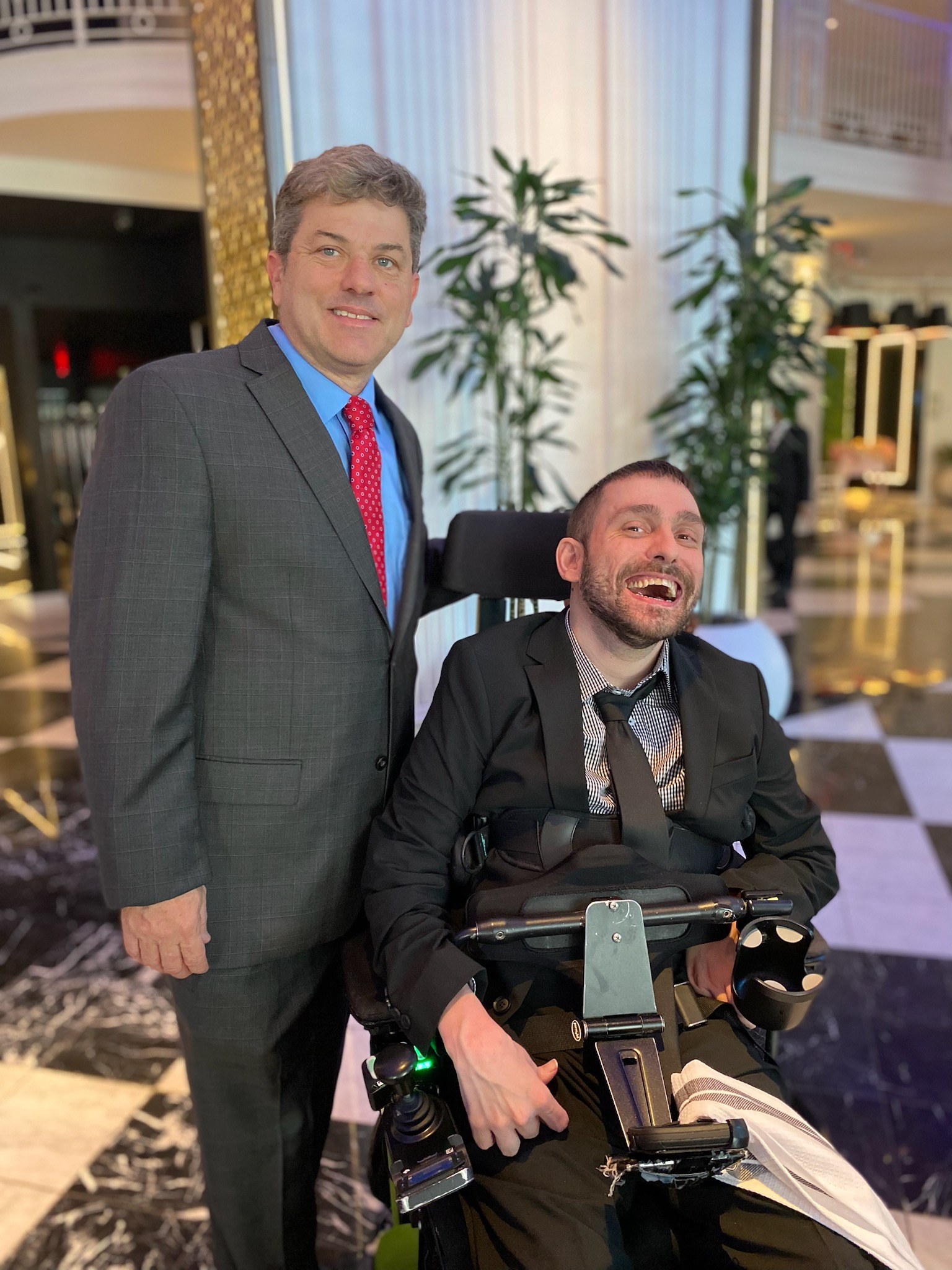
The year ended as it began with our community in crisis. It started with NCCDD and our community advocating to meet the unmet needs of individuals with I/DD due to our waiting list and workforce shortage. The year ended on September 30th with NCCDD advocating to meet the needs of our community in western North Carolina which was devastated by Hurricane Helene.
Throughout the year, we made a difference. Our Council Chair spoke at the White House in June about our work to increase direct support professional (DSP) rates. We brought 22 individuals with I/DD and family members to speak to legislators in a packed auditorium of the General Assembly in May. That same month, we held a hybrid town hall in Charlotte with legislators and 250+ individuals with I/DD and family members. We had intense monthly policy education meetings with state leaders and our I/DD community on care coordination, 1915(i) Medicaid, the waiting list, inclusive post-secondary education, employment, CAP-DA and CAP-C, the DSP workforce shortage, and the other critical issues impacting our community.
Our Council-funded initiatives have shown a positive impact in the three areas that guide our work: Goal 1: Financial Asset Development, Goal 2: Community Living, and Goal 3: Advocacy. See Creating Statewide Change: Council Funded Initiatives for details on how our initiatives have made and continue to make a positive difference for NC individuals with I/DD.
Finally, we communicated often and in multiple ways to make sure we reached our community on all of the new services, changes, and issues impacting our community. NCCDD ends 2024 knowing that we made a difference and committed to continuing to ensure that everyone with I/DD can live full and meaningful lives in their community.
Talley Wells, NCCDD Executive Director
Bryan Dooley, NCCDD Council Chair
Amplifying Advocates Stories
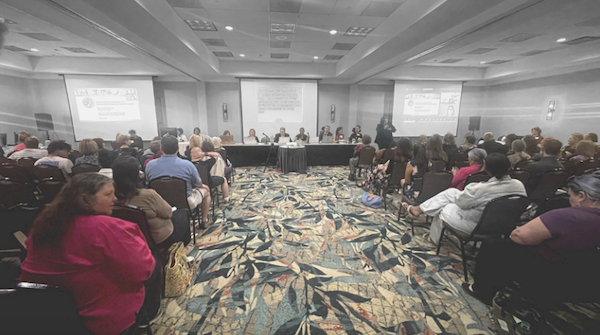 During this past year, individuals with intellectual and other developmental disabilities (I/DD) and family members had two great opportunities to connect with legislators.
During this past year, individuals with intellectual and other developmental disabilities (I/DD) and family members had two great opportunities to connect with legislators.
On May 2, 2024, NCCDD teamed up with Charlotte advocacy organizations, providers, and legislators to hold a Developmental Disabilities Town Hall in Charlotte. The event included 270 people online and in-person. We received a special welcome from Jose Hernandez-Paris of the Latin American Association and Khristina Hernandez. Then, we heard from Senator Jim Burgin, Representative Carla Cunnigham, and Representative Terry Brown. The night ended with important questions and comments from our community.
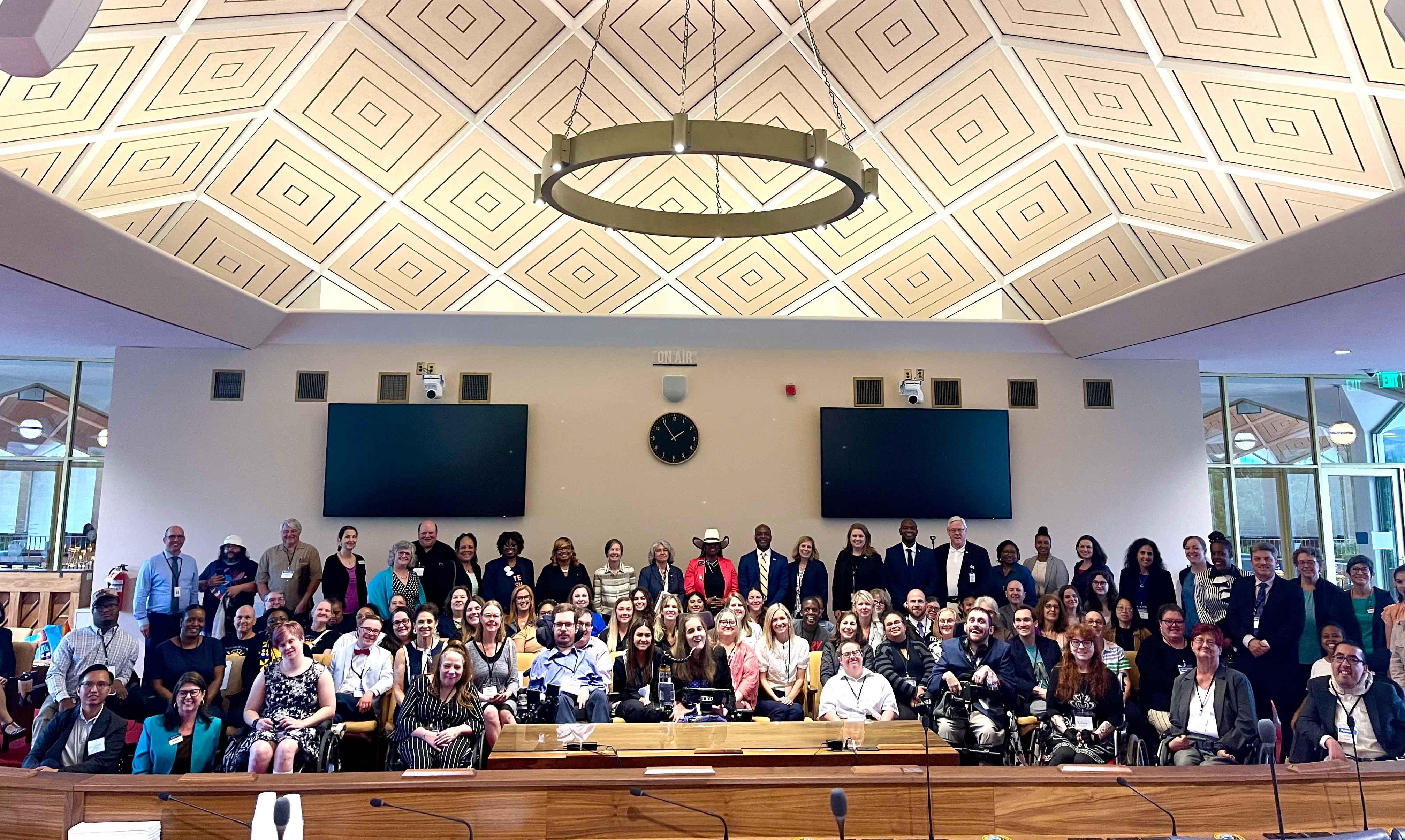 Less than two weeks later, the I/DD Legislative Caucus held a listening session at the Legislative Building Auditorium. Meet The Need NC, an initiative funded by NCCDD, and many other groups worked with the Legislative Caucus and NCCDD to plan the event. Twenty-three individuals with I/DD, family members, and advocates spoke to legislators. There were over 110 people in attendance, including 15 legislators. Many advocates also met with legislators who were unable to attend the Caucus.
Less than two weeks later, the I/DD Legislative Caucus held a listening session at the Legislative Building Auditorium. Meet The Need NC, an initiative funded by NCCDD, and many other groups worked with the Legislative Caucus and NCCDD to plan the event. Twenty-three individuals with I/DD, family members, and advocates spoke to legislators. There were over 110 people in attendance, including 15 legislators. Many advocates also met with legislators who were unable to attend the Caucus.
At both events, individuals and families told their stories of how the Direct Support Professional workforce shortage and the Innovations Waiver waiting list have impacted their lives. Legislators shared how important it was to hear from people across the state about these issues as they make policy and budget decisions.
These are just a few examples of how we advocate for our community alongside individuals with I/DD and their families.
270 People attended the DD Town Hall
110 People attended and 23 advocates spoke during the I/DD Legislative Caucus
15 Legislators attended the events
Hispanic Disability Outreach

At NCCDD, intellectual or other developmental disabilities (I/DD) are part of all of our diverse communities. That’s why it’s important to learn about disabilities and know about the services and resources that are available for people with I/DD and their families.
To better understand the needs of the Hispanic community, NCCDD is working directly in the community through NCCDD’s Hispanic Disability Community Advocate, Irlanda Ruiz, who attended resource fairs, parent meetings, conferences; made visits to organizations; and gave presentations in several counties. NCCDD now offers resource materials in Spanish to make sure the information is easy for everyone to understand.
Events and activities attended: 43
Counities visited: 8
Families engaged with: 35
Organizations that now have NCCDD materials: 125
Individuals with I/DD who attended events/activities: 150
"Introduction to NCCDD" brochures distributed: 965
Celebrating North Carolina Advocates
Each year in November, NCCDD honors the significant contributions made by advocates who are actively working to change attitudes and support greater choices for a more inclusive North Carolina. The Council established its Advocacy and Leadership Awards to recognize leaders in the I/DD community who help build a better North Carolina for all people with I/DD. The following award recipients for 2023 were:
- North Carolina Leadership Achievement Award: Jacklyn Boheler
- Jack B. Hefner Memorial Award: Sarah Potter
- Helen C. "Holly" Riddle Distinguished Service Award: Dr. Bill Milner and Betsy White of ACCESS Dental
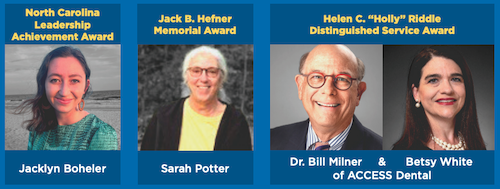
Learn more about the 2023 recipients
Creating Statewide Change: Council Funded Initiatives
This was the third year of NCCDD’s 2022-2026 Five-Year State Plan. The State Plan aims to advance the Developmental Disabilities Assistance and Bill of Rights Act (DD Act) through its requirements of self-determination, independence, productivity, integration, and inclusion for individuals with intellectual or other I/DD and their families. There are three goals that NCCDD projects fall under: Financial Asset Development, Community. Living, Advocacy. Cross Cutting initiatives overlap all three state plan goals. Please note that the numbers provided are the total count of engagement and reach across NCCDD initiatives.
The following are the initiatives we supported during FY 2023-2024. You can find more information about each project on our Current Initiatives page.
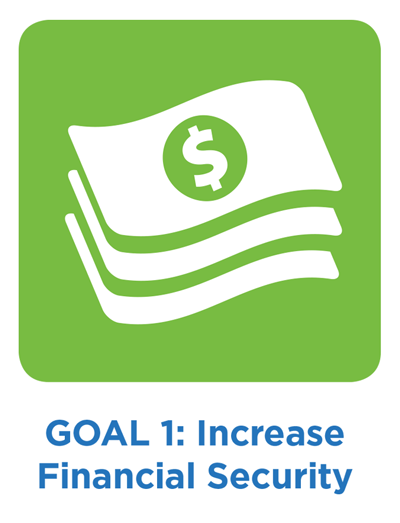 Goal 1: Financial Asset Development Initiatives
Goal 1: Financial Asset Development Initiatives
Funded four initiatives to increase Competitive Integrated Employment (CIE), promote the establishment of inclusive post-secondary education (IPSE) programs at NC historically black colleges and universities (HBCU), expand benefits counseling, and teach about pre-employment Transition Services (PreEts).
Competitive Integrated Employment Engagement (CIE), White Paper and Conference: The i2i Center for Integrated Health brought the I/DD community together to further an understanding and inclusion of all CIE perspectives as the state increases CIE opportunities. A conference was held in December 2023 with nearly 150 attendees, including 50 of those receiving consumer/family/advocate discounts.
NC Black Disabilities Network Training to Promote Establishment of IPSE programs at NC HBCU: Partnered with the North Carolina Black Disabilities Network to grow awareness and educate about the need to make inclusive postsecondary education (IPSE) programs more accessible in North Carolina in Historically Black Colleges and Universities (HBCU). The initiative reached out to all 11 HBCU campuses and was able to extend information sharing and training directly to six universities on information about what defines an IPSE program, the definition of intellectual disability, and insight into model programs, accreditation standards, and resources.
North Carolina Benefits Counseling Expansion Project: This initiative sought to increase employment participation–and therefore independence–across the state through benefits counseling. An 11-member Benefits Counseling Expansion Advisory Committee was created, along with training and outreach initiatives.
- Reached out to 270+ organizations that serve individuals with I/DD across the state
- Formalized 21 partnerships through Memos of Understanding (MOUs)
- Established the Benefits Counseling Expansion advisory committee (11 members)
- Trained 119 Benefits Liaisons across the state
- 88 individuals with I/DD received benefits counseling from a trained Benefits Liaison
- 198 family members were trained in benefits
- Provided benefits counseling services to 21 individuals with I/DD and their families
Pre-employment Transition Services (PreEts): NCCDD hosted a PreEts presentation in September 2024 to 27 attendees on how to apply the program. Stephanie Hanes, Program Specialist for Transition Services with Division of Employment and Independence for People with Disabilities (EIPD), provided insight and education on where the program needs to be expanded across the state.
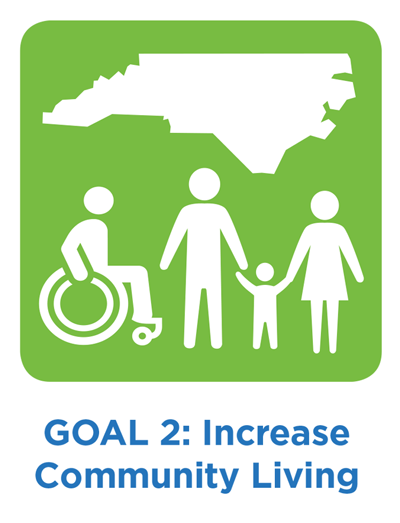 Goal 2: Community Living
Goal 2: Community Living
Funded four initiatives focused on guardianship and supported decision making (SDM), the collection of I/DD data, supported living, and additional short-term initiatives.
After the Law: Guiding the I/DD Community to Supported Decision-Making: Continued to build upon the work of its previous initiatives focused on alternatives to guardianship and capitalize on the passage of the new Guardianship Rights law by educating stakeholders about this law and by educating community members on how these rights may specifically offer more independence in healthcare decision-making. The initiative created three new Less Restrictive Alternative Resource Guides; expanded the original list of less restrictive alternatives from 12 to 22; and consulted with more than 18 subject matter experts, including 3 people with I/DD and 5 family members, regarding the content and format of the new educational materials.
Community Living Mini-Grants: Funded seven short-term initiatives focused on advancing NCCDD’s Community Living goal:
- Autism Grown Up created three courses for the Life Course Library focused on transition planning, employment resources, and navigating adulthood available free of charge here at www.LifeCourseLibrary.com. (Read an article about this initiative)
- Best Buddies International, Inc. hired a Transitions Manager who has developed relationships with schools and provided pre-employment training through 22 transition-related workshops that benefited 43 students with I/DD.
- Bloom Fitness Corporation helped to increase health and wellness opportunities for people with I/DD by making a highly accessible fitness app that is now available for both iOS and Android devices. (Read an article about this initiative)
- Chapters Ahead Inc. established a Next Chapter Book Club at Wingate University that five people with I/DD have participated in and also had conversations with three other universities about establishing a Next Chapter Book Club.
- East Carolina University developed three on-line checklists available in English and Spanish to address the transportation needs of people with I/DD to identify skills, abilities, and challenges that are enhancers or barriers to effective community mobility.
- The National Leadership Consortium, an Affiliate of CQL | The Council on Quality and Leadership conducted a review of 5 organizations providing community living services in order to understand the strategies, structures, and practices that advance community living opportunities for people with I/DD.
- ZABS Place enhanced the development and implementation of the Dream Link Skills Development Tracker and Job Placement Portal, onboarded 29 trainees with I/DD to use the Dream Link Skill Builder, and saw 7 successful job placements resulting from the skill development features of the platform.
I/DD Data: Collaborated with Duke University to gather data related to North Carolina’s I/DD population to help NCCDD, policymakers, and legislators better understand the I/DD population in North Carolina, their needs, and the cost of services and supports for this population. Duke University has met with data experts, identified six main research themes, identified future research questions to ask, and is compiling a Final Report on the research completed.
Supported Living: A How-to Guide: Engaged with FIRSTwnc to complete the Supported Living How-to Guidebook focused on helping individuals with I/DD, family members, and provider agencies understand how to provide successful Supported Living services for individuals with the highest levels of need. This work included participating on the Supported Living Level 2 & 3 Action Team, participating in quarterly Stakeholders gatherings, and meeting with North Carolina Medicaid staff to clarify the language used to describe each level of Supported Living to help providers deliver services more effectively.
In-house activities:
- Council staff helped to advance NCCDD’s transportation objective under its Community Living goal by participating in Work Together NC Transportation Workgroup meetings and helping the Raleigh Mayor’s Committee for Persons with Disabilities host a Transportation Public Meeting in August 2024.
- Council staff also helped to advance NCCDD’s transition education and lifespan planning objective by participating on the Money Follows the Person Weaving Connections Steering Committee focused on understanding and improving natural supports for people with I/DD and by assisting people with I/DD to begin the process of developing strong Personal Support Networks.
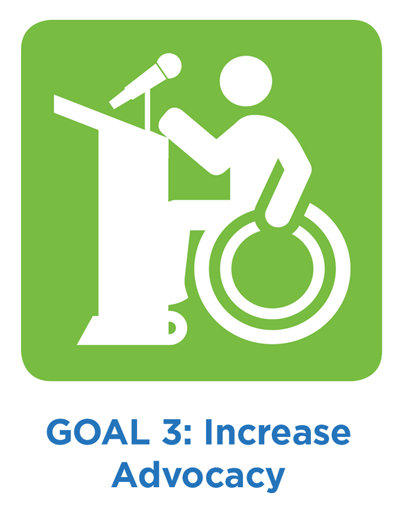 Goal 3: Advocacy Development
Goal 3: Advocacy Development
Funded three initiatives focused on building advocacy leadership through training and peer mentoring programs. Supported a monthly self-advocate discussion series and held a Spanish viewing of the film “Unmet: The Disability Crisis in NC”.
Ability Leadership Program of North Carolina (ALP-NC): An innovative peer-led leadership development training initiative designed to empower advocates within the disability rights community. ALP-NC is committed to crafting accessible, inclusive skill-building spaces for individuals with intellectual and developmental disabilities (I/DD), their family members, guardians, professionals, and other stakeholders who are committed to systemic change. Achievements of the intiative include:
- 4 program graduates attended I/DD Caucus Day in May 2024 and 2 of them shared their story with the North Carolina General Assembly.
- 35 Leader graduates from the 3 cohorts
- 3 Producers established across the initiative
- 1 Coordinator and 1 Director (both are also Producers and Facilitators)
- 3 Senior Facilitators, including 1 video instructor
- 2 Junior Facilitators
- 9 monthly Facilitator meet-ups
- 1 Alumni meet-up
- 7 Learning Team meetings
- 4 Initiative presentations/Information were held to market the ALP-NC training program
- Coordinator and Director presented at the National Association of Councils on Developmental Disabilities Conference in July 2024
- 100+ people receive the monthly newsletter
Advocacy Leaders Network: North Carolinian graduates from state and nationally recognized advocacy and leadership development training programs were brought together to begin building a developmental disabilities advocacy leader network. This initiative aimed to identify, track, further train, and inform the graduates so, as members of the NC Advocacy Leaders Network, they can be informed and organized to educate others about I/DD issues important to them all North Carolinians.
- 45 members of the network
- Conducted 3 “Information Sharing and Gathering” with events a total of 80 people attending
- 28 invitation-only participants attended 4 ECHO Case Addressing Sessions.
Peer Mentor Training Program - Bridging Pathways: The I/DD Peer Mentoring Initiative is a pioneering effort that offers a holistic approach to developing and growing the utilization of peer mentoring for people with intellectual and developmental disabilities (I/DD). The training program is for peer mentors to develop leadership skills and paid internships for hands-on mentorship experience and professional growth. Graduates have been hired as independent contractors in various positions, appointed to advisories and committees, topic expert presenters and speakers at live events and for video recordings, and participated in disability rights listening sessions.
- 2 cohorts implemented with 26 individuals during 2023-2024
- Developed partnerships with 3 organizations/agencies: Alliance Health, EasterSeals UCP, and Employment and Independence for People with Disabilities
Self-Advocate Discussion Series: The one-hour monthly Self-Advocate Discussion series is coordinated by NCCDD Staff and facilitated by the NCCDD Policy Education Coordinator. The series features topics that are important to I/DD advocates. Targeted inclusion of the NC Hispanic Community is supported through a dedicated Spanish Language interpreters Channel.
- 12 sessions were held in FY 2023-2024 with 545 attendees
Unmet: The Disability Crisis in NC: This film, initially released in 2023, had a special viewing on March 23, 2024 to further the outreach of this film. Over 40 members of Charlotte’s Latino community gathered to watch Unmet: North Carolina’s Disability Crisis in Spanish. The event was followed by a community conversation to give attendees the chance to voice concerns specific to their community. By providing both a platform and resources, the event empowered Latino families to advocate for their loved ones and work to bridge the gap in service access.
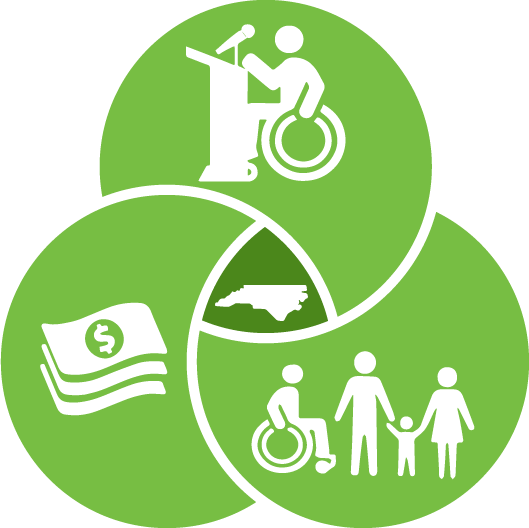 Cross Cutting
Cross Cutting
Funded two initiatives that overlap the three state plan goals.
Meet The Need NC: An advocacy initiative focused on systemic change in North Carolina using a Collective Impact model to meet the service and support needs of those with I/DD and their families throughout their lifespans. The initiative aims to develop and expand a statewide I/DD grassroots, lived experience network to become the driver of Meet The Need NC, and ensure sustainability of the initiative. Meet The Need NC’s primary focus is addressing the issues of the ever-growing Innovations Waiver waitlist and direct support professional (DSP) workforce crisis.
Media Relations: Marketing and communications initative to implement a strategic marketing plan to raise awareness of the mission of NCCDD and its resources available to elected officials, state leaders, and local organizations across the state; assist NCCDD in communicating the work of existing grant initiatives information with key decision makers at the state and local level; assist NCCDD in the communication of public policy issues that impact the independence and inclusion of individuals with I/DD and their families; and assist NCCDD in community outreach and collection of public input from individuals with I/DD and their families on opportunities and barriers they face in everyday life to guide the development of funded grant initiatives, public policy goals, and systems change activities.
Budget for FFY 2023-2024
| FFY Budget 2023-2024 | $ 2,168,620 |
| *Expenses to Date | $ 2,149,135 |
| FFY 2023 Balance | $19,485 |
*For the Period of October 1, 2022 – September 30, 2024
| BUDGET | AMOUNT |
| Finanical Asset Development | $350,020 (16.1%) |
| Advocacy Development | $516,279 (23.8%) |
| Community Living | $404,078 (18.6%) |
| Cross Cutting Functions | $304,839 (14.1%) |
| Operations & Administration | $593,404 (27.4%) |
| TOTAL BUDGET | $2,168,620 |